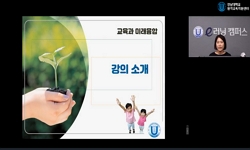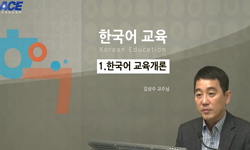This paper aims to seek and identify the roles and future tasks of the Korean Language Education (KLE) in the curriculum alignment and convergence. The relevant literature in this area focused usually on topics and themes for curriculum alignment and ...
http://chineseinput.net/에서 pinyin(병음)방식으로 중국어를 변환할 수 있습니다.
변환된 중국어를 복사하여 사용하시면 됩니다.
- 中文 을 입력하시려면 zhongwen을 입력하시고 space를누르시면됩니다.
- 北京 을 입력하시려면 beijing을 입력하시고 space를 누르시면 됩니다.

교과 간 연계·융합 교육에서의 국어 교과의 역할과 향후 과제 = Roles and Future Tasks of the Korean Language Education in the Curriculum Alignment and Convergence
한글로보기부가정보
다국어 초록 (Multilingual Abstract)
This paper aims to seek and identify the roles and future tasks of the Korean Language Education (KLE) in the curriculum alignment and convergence. The relevant literature in this area focused usually on topics and themes for curriculum alignment and integration, while there were less attention on KLE and other subjects in terms of curriculum dimension. Therefore, this study identified how KLE can be aligned and integrated with other subjects from the analyses of curriculums. Three patterns were emerged: (1) KLE’s contents with other subjects’contents, (2) KLE’s skills and others’contents, and (3) KLE’s skills and others’skills. Based on the identified patterns, the notion of the curriculum alignment and integration was reconceptualized and expanded. The curriculum alignment and convergence between KLE and other subjects were possible when they were designed to teach simultaneously. However, curriculum alignment can also be expanded when previously learned KLE’s skills could be applied to learn later contents and skills of the other subject. In this sense, KLE contributed to curriculum alignment and convergence in a significant way when it focused to help students learn language use. Based on the aforementioned discussions, future tasks for curriculum alignment and integration were suggested and discussed.
참고문헌 (Reference)
1 조재윤, "핵심 역량 중심 국어과 융합 교육의 가능성과 한계" 한국어문교육연구소 (22) : 5-40, 2017
2 허경철, "학문의 통합, 교과의 통합 그리고 교육과정의 통합" 에듀인뉴스 114-127, 2016
3 김평원, "프로젝트 수행법을 위한 융합교육과정의 설계 - 화법과 작문을 반영한 수레바퀴모형을 중심으로 -" 한국교육과정평가원 13 (13): 49-78, 2010
4 민용성, "통합 교육과정의 구성 방식에 관한 일고" 학습자중심교과교육학회 (10) : 61-80, 2005
5 천경록, "초등 사회과 교과서의 학습읽기 전략 실태" 한국국어교육학회 (110) : 39-65, 2017
6 정미경, "초・중등학교 융합형 교육프로그램 개발 연구" 한국교육개발원 2014
7 김종윤, "창의・융합 과정으로서의 독서 개념의 타당성 고찰" 한국독서학회 (35) : 79-109, 2015
8 서명희, "창의적 문제 발견 능력 함양을 위한 문학 ‧경제 융합 교육 -언어적 창의성을 중심으로-" 학습자중심교과교육학회 14 (14): 77-99, 2014
9 김종철, "창의와 융합의 국어교육" 사회평론 2015
10 원진숙, "창의 융합 시대 초등 국어교육의 다변화 전략" 한국초등국어교육학회 (59) : 5-43, 2015
1 조재윤, "핵심 역량 중심 국어과 융합 교육의 가능성과 한계" 한국어문교육연구소 (22) : 5-40, 2017
2 허경철, "학문의 통합, 교과의 통합 그리고 교육과정의 통합" 에듀인뉴스 114-127, 2016
3 김평원, "프로젝트 수행법을 위한 융합교육과정의 설계 - 화법과 작문을 반영한 수레바퀴모형을 중심으로 -" 한국교육과정평가원 13 (13): 49-78, 2010
4 민용성, "통합 교육과정의 구성 방식에 관한 일고" 학습자중심교과교육학회 (10) : 61-80, 2005
5 천경록, "초등 사회과 교과서의 학습읽기 전략 실태" 한국국어교육학회 (110) : 39-65, 2017
6 정미경, "초・중등학교 융합형 교육프로그램 개발 연구" 한국교육개발원 2014
7 김종윤, "창의・융합 과정으로서의 독서 개념의 타당성 고찰" 한국독서학회 (35) : 79-109, 2015
8 서명희, "창의적 문제 발견 능력 함양을 위한 문학 ‧경제 융합 교육 -언어적 창의성을 중심으로-" 학습자중심교과교육학회 14 (14): 77-99, 2014
9 김종철, "창의와 융합의 국어교육" 사회평론 2015
10 원진숙, "창의 융합 시대 초등 국어교육의 다변화 전략" 한국초등국어교육학회 (59) : 5-43, 2015
11 이인식, "지식의 대융합" 고즈윈 2008
12 유상희, "지식 탐구의 도구로서 논증적 글쓰기에 대한 고찰- CCSS 범교과 문식성 영역을 중심으로 -" 한국작문학회 (32) : 83-116, 2017
13 교육부, "제4차 산업명 시, 창의융합형 인재 양성으로 비: 2017년 융합인 재교육(STEAM) 사업 공모"
14 박주현, "인문소양 강화를 통한 인성교육 방안: 중등 국어과·역사과·도덕과를 중심으로" 한국교육과정평가원 2016
15 김라연, "융합독서의 개념 및 시행에 대한 예비 국어교사들의 인식 분석" 우리말학회 (50) : 171-202, 2017
16 윤여탁, "융복합적 미래 인재 양성을 위한 국어교육의 과제: 광고를 활용한 교수·학습을 중심으로" 서울대학교 교육종합연구원 80 : 21-40, 2014
17 차윤경, "융복합교육의 확장적 재개념화 가능성 탐색" 한국다문화교육학회 9 (9): 153-183, 2016
18 김시정, "융복합 교육의 양상에 대한 국어교육적 접근" 국어교육학회 (43) : 125-153, 2012
19 전두리, "융복합 교육으로서 학교문화예술교육의 개념과 의미 탐색 - 문학, 음악, 미술, 연극의 연계를 중심으로 -" 한국국어교육학회 (106) : 93-124, 2016
20 구본관, "언어 중심 교과 통합의 가능성 탐색" 국어국문학회 (176) : 299-340, 2016
21 최인자, "사회 정서 학습을 위한 내러티브 기반 교과 융합 인성교육" 국어교육연구소 (36) : 337-360, 2015
22 김정효, "미술과 중심의 융합인재교육(STEAM)이 미술과 교육과정에 주는 시사점 탐색" 한국교육과정평가원 2012
23 김종윤, "디지털 리터러시의 인지적 영역 평가도구 개발을 위한 기초 연구" 청람어문교육학회 (62) : 7-39, 2017
24 박인기, "국어교육의 융‧복합교육 기능과 작용" 한국어교육학회 (152) : 1-33, 2016
25 구본관, "국어과와 도덕과의 교과 통합 교육을 위한 내용 구성 방안-‘배려적 언어 사용’ 교육 내용을 중심으로-" 한국문학언어학회 (72) : 9-45, 2017
26 노은희, "국어과 중심의 교과 간 통합에 대한 일고찰" 청람어문교육학회 (45) : 169-190, 2012
27 정민주, "국어과 예비 교사의 교과 융합형 수업 설계 경험에 관한 연구" 국어교육학회 51 (51): 181-214, 2016
28 교육부, "국어과 교육과정. 교육부 고시 제2015-74호 [별책 5]"
29 김규훈, "국어 능력의 융복합적 개념화 탐색 -매개 담론을 통한 핵심 개념 설정을 중심으로-" 우리말글학회 67 : 77-109, 2015
30 교육과학기술부, "국가융합기술 발전 기본계획(’09∼’13)"
31 곽영순, "교사의 학교 수준 교육과정 편성‧운영 역량 강화 방안 (Ⅲ) : 교사 학습공동체 모델 개발 및 실행" 한국교육과정평가원 2015
32 차경미, "과학의 언어에 대한 국어교육적 접근 - 국어ㆍ과학 융합 교육의 방향 설정을 위한 시론 -" 국어교육학회(since1969) (58) : 35-68, 2015
33 Next Generation Science Curriculum[NGSC], "Topic arrangement of the NGSS: K.weather and climate"
34 Adler, M., "The interdisciplinary continuum: Reconciling theory, research and practice" National Research Center on English Learning &Achievement, University at Albany, State University of New York 1997
35 Ontario Ministry of Education, "The Ontario curriculum grades 1 to 8:Language"
36 Fogarty, R., "Ten Ways to integrate the curriculum" 49 (49): 61-65, 1991
37 Shanahan, T., "Teaching disciplinary literacy to adolescents:Rethinking content-area literacy" 78 (78): 40-59, 2008
38 Michigan State University, "State of Michigan reading requirements:Michigan’s original reading requirement Retrieved"
39 Drake, S. M., "Meeting standards through integrated curriculum" Alexandria, VA 2004
40 NSW Department of Education, "Literacy and numeracy strategy 2017-2020"
41 Dewey, J., "Experience and Education" The MacMillan Company 1956
42 Drake, S. M., "Creating standards-based integrated curriculum" A SAGE Company 2012
43 Moore, D. W., "An historical exploration of content area reading instruction" 18 : 419-438, 1983
44 권점례, "2015 개정 교육과정에 따른 초‧중학교 교과 간 연계‧융합 교육 적용 방안 연구" 한국교육과정평가원 2017
45 정영근, "2015 개정 교육과정에 따른 성취기준 코딩 체계 구축을 통한 교과 간 연계・융합 학습 강화 방안 연구" 한국교육과정평가원 2016
46 교육부, "2015 개정 교육과정 총론 및 각론 확정・발표"
동일학술지(권/호) 다른 논문
-
- 한국어교육학회
- 서영진
- 2018
- KCI등재
-
성인의 문학능력의 성격과 전망-성인의 문학 문식성의 유형과 그 성격을 중심으로-
- 한국어교육학회
- 김찬기
- 2018
- KCI등재
-
묵변의 화용론 -논변(辯)의 수행을 위한 언어 이론의 탐구-
- 한국어교육학회
- 권대호
- 2018
- KCI등재
-
한국어능력시험의 사고도구어 사용 양상 연구 -TOPIK과 EJU의 사고도구어 계량적 분석 비교를 중심으로-
- 한국어교육학회(구 한국국어교육연구학회)
- 정지호 ( Jung Ji-ho )
- 2018
- KCI등재
분석정보
인용정보 인용지수 설명보기
학술지 이력
| 연월일 | 이력구분 | 이력상세 | 등재구분 |
|---|---|---|---|
| 2027 | 평가예정 | 재인증평가 신청대상 (재인증) | |
| 2021-01-01 | 평가 | 등재학술지 유지 (재인증) |  |
| 2018-01-01 | 평가 | 등재학술지 유지 (등재유지) |  |
| 2015-01-01 | 평가 | 등재학술지 유지 (등재유지) |  |
| 2011-01-01 | 평가 | 등재학술지 유지 (등재유지) |  |
| 2009-01-01 | 평가 | 등재학술지 유지 (등재유지) |  |
| 2007-01-01 | 평가 | 등재학술지 유지 (등재유지) |  |
| 2006-02-24 | 학술지명변경 | 외국어명 : 미등록 -> Korean Language Education |  |
| 2005-01-01 | 평가 | 등재학술지 유지 (등재유지) |  |
| 2002-01-01 | 평가 | 등재학술지 선정 (등재후보2차) |  |
| 1999-07-01 | 평가 | 등재후보학술지 선정 (신규평가) |  |
학술지 인용정보
| 기준연도 | WOS-KCI 통합IF(2년) | KCIF(2년) | KCIF(3년) |
|---|---|---|---|
| 2016 | 1.01 | 1.01 | 0.94 |
| KCIF(4년) | KCIF(5년) | 중심성지수(3년) | 즉시성지수 |
| 0.92 | 0.96 | 1.335 | 0.5 |




 KISS
KISS







